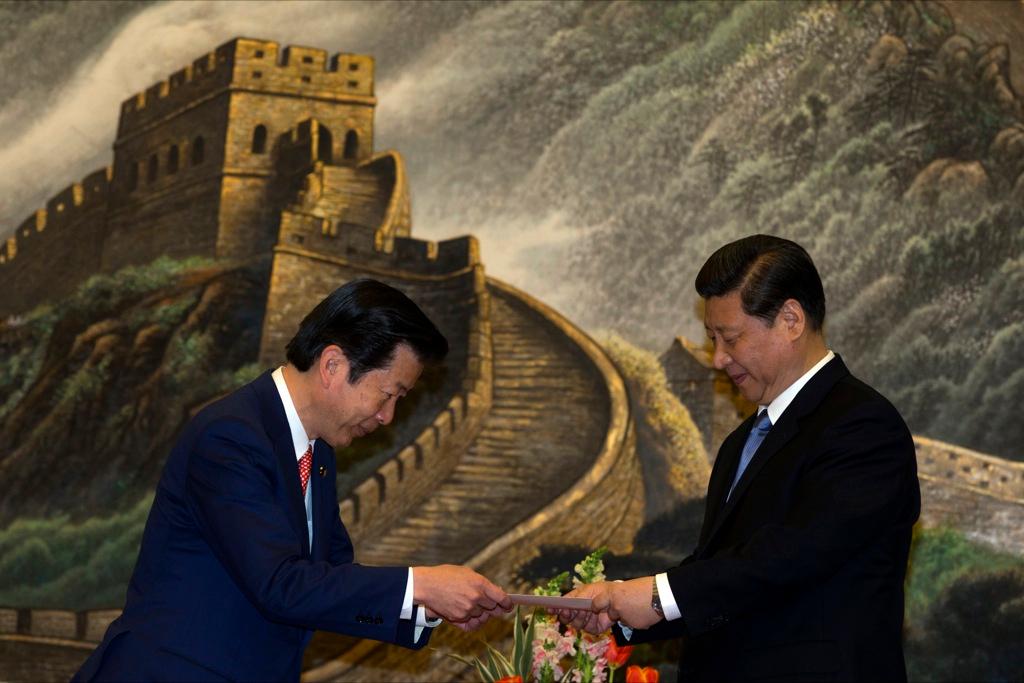Japanese prime minister sends olive branch to China
New Komeito party leader Natsuo Yamaguchi (L) of Japan delivers a personal letter from Japan Prime Minister Shinzo Abe to Chinese Communist Party Secretary-General Xi Jinping during a meeting at the Great Hall of the People January 25, 2013 in Beijing, China, Yamaguchi said today that he believed Japan’s dispute with China over a group of uninhabited islands could be resolved, according to published reports.
HONG KONG — Japanese prime minister Shinzo Abe reached out to China on Thursday, delivering an extremely cordial letter to new Chinese leader Xi Jingping by way of an envoy.
No new revelations into the tense relationship between the two East Asian powers were contained in the friendly missive, however.
Abe sent envoy and coalition ally Natsuo Yamaguchi to deliver the message to Xi Jingping at Beijing's Great Hall of the People. Afterward, the two parties reportedly had a pleasant discussion about a possible resolution to the conflict over the islands known as Senkaku in Japanese and Diaoyu in Chinese, wrote the Washington Post.
Read more from GlobalPost: China and Japan one step closer to war
Abe's letter noted that his nation would like to "push forward Japan-China strategic relationships for mutual benefit" of the two countries that have one of the world's most important bilateral relationships, wrote the Associated Press.
"Mr. Yamaguchi visits China at a period in which Sino-Japanese relations face a special situation. We attach great importance to your visit," said Xi Jingping, according to the AP.
Read more from GlobalPost: Japan v. China: Small islands, big worry
GlobalPost Senior Correspondent in Hong Kong Benjamin Carlson said the move by Japan was a heartening sign.
"After weeks of escalations, Japan and China appear to be stepping back from the brink," he said. "It's particularly significant that General Secretary Xi Jinping — the most powerful man in China, and a notable nationalist — met with Yamaguchi. Abe's conciliatory letter was the olive branch, but there was no guarantee that Xi would accept it."
Carlson said, however, that there was a long way to go before the issue was resolved.
"Both Japan and China have stressed that they will not back down on their claims to the Senkakus/Diaoyus, and given the domestic pressures on both governments not to give in, it's hard to see how further diplomacy will resolve much of anything without a significant change in stance," he said.
According to the Washington Post, Chinese Foreign Ministry spokesman Hong Lei noted that Japan needed to “face up to history and reality, take real action, work with China on seeking an effective way through dialogue to properly control and resolve” their differences.
“Japan should respect the national sentiments of the Chinese people and handle historical issues correctly,” Hong added.
Yamaguchi is the current leader of the New Komeito party, an ally of Abe's, but does not now hold any formal role in the Japanese government.
Both nations have stepped up their air presence in the region, while Japan was reportedly contemplating allowing its F-15 fighters to shoot tracer bullets at Chinese aircraft violating their perceived air space earlier in the month.
Every day, reporters and producers at The World are hard at work bringing you human-centered news from across the globe. But we can’t do it without you. We need your support to ensure we can continue this work for another year.
Make a gift today, and you’ll help us unlock a matching gift of $67,000!
